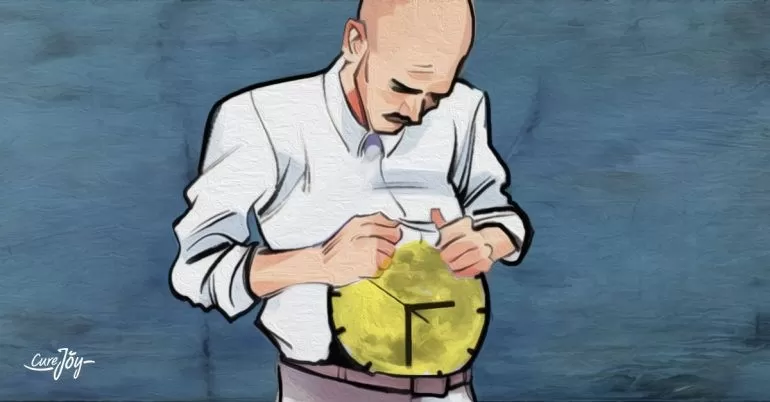Your health, weight, and environment affect how long you can survive without food. While short-term fasting is beneficial for health because it reduces the risk of obesity and allows better control of diabetes. Starvation for more than 48 hours causes your glucose reserves to be released, and after 72 hours your body begins to eat its protein reserves, which results in muscle loss, decreased bone density, and even kidney and heart problems. Prolonged starvation or lack of food causes blood poisoning, multiple organ failure and eventually death. Next, by answering the question, how long can we survive without food? Be with Net wrote.
how long can you go without food
Starvation for more than 72 hours breaks down your fat stores
How long can we survive without food?
It depends on your health and environment.
On average, people can survive with only water and no food for 2 days.
Glucose reserves are released after 48 hours of starvation, and proteins break down after 72 hours of starvation.
Early symptoms include fatigue, muscle wasting, and hair loss.
Prolonged starvation causes blood poisoning and organ failure.
How long we can survive without food is a fascinating question for the human species, however the exact length of time is not yet known, currently research on the effects of starvation gives us an idea of what to expect from prolonged starvation. We must have and the consequences are not as pleasant as expected.
Some people can survive without food for more than 70 days
If you’re curious about how long humans can survive without food, some of the answers lie in the statistics of hunger strikes, possibly one of several categories of people who were monitored during voluntary food deprivation. In most cases, not very good things.
Indian freedom fighter and leader Mahatma Gandhi survived for 21 days without food. The 74-day strike of Terence McKinney, an Irish political prisoner, is the longest on record, eventually ending in his death. Most of those around him died in the strike between 46 and 73 days.
While it can be said that Ibn is the length of time you can survive without food, but its amount depends significantly on the physical health and environmental conditions of the person.
But your survival without food depends on your body and environment
One of the challenges in determining the exact amount is that not all people respond to food deprivation in the same way, some people may be able to survive longer without food while others may feel dizzy within a few hours. Medical health, health problems such as diabetes, your body weight and environmental conditions such as weather may determine your ability to survive without food. For example, the risk of heart attack and related complications increases with a body mass index (BMI) of 12 to 12.5. A healthy body mass index is between 18.5 and 24.9.
During starvation when your body mass index approaches 12 to 12.5 it is expected that your problems can seriously threaten your life. Although some people may have complications before reaching this index due to fat reserves, vitamin and mineral content in the body and general health status.
On average, a person should be able to live without food for 2 days
As you can imagine, controlled studies on starvation are practically impossible due to ethical issues and the risk of mortality. Although eating disorders such as anorexia nervosa and hunger strikes, in which people voluntarily deprive themselves of food, give us little information about hunger and food deprivation. Most people, assuming they are not diabetic and in good general health, can survive without experiencing any problems even if they do not eat much. After that, the side effects start slowly and continuously, after these words, this amount may be less depending on the health and environmental conditions.
how long can you go without food
As long as you drink water
Of course, this is assuming that you continue to drink water, without water your body’s reaction will be much more severe and your survival will decrease dramatically. Again, survival without water varies depending on the condition and health of the body, but if you sweat and don’t replace the lost fluid, you will feel sick in a few hours.
Glucose is released after the second day, protein breaks down after the third day
When you are without food, your body slows down to conserve as much energy as it can. Also, the body begins to use glycogen stores in the muscles and liver to create energy with glucose. After using these reserves, the body starts using fat reserves and finally protein. Protein is the building block of your cells, used to create energy in a process called ketosis, which is not good for you at all.
The initial 24-48 hours without food: Your glucose stores are usually depleted in 6 hours, although some stores may last for 24-48 hours, fat may also be broken down.
After 72 hours: Autophagy or protein breakdown begins when fat stores are used up for energy.
The first days of starvation cause fatigue, muscle and hair loss
- Weakness and fatigue that may cause you to faint
- Muscle loss
- Decreased bone density makes bones brittle and dry
- Heart problems due to the weakening of the heart muscle and reduced pumping power of the heart
- Low blood pressure due to reduced pumping
- slow pulse
- Ulcers are possible complications due to slow blood circulation
- feeling cold
- Kidney failure due to lack of water
- Loss of head hair and growth of body hair to maintain body heat
Prolonged starvation can cause severe side effects and even death
People who died from not eating for a long time due to some disorders include:
Multiple organ failure
Ventricular fibrillation, or a fast heart rhythm that causes the heart to fail to pump and may lead to loss of consciousness and even death
Severe sepsis (blood poisoning) in which the body self-damages organs and tissues in response to infection.
Eating food without nutritional value also causes organ failure and heart problems
In addition to people who don’t eat, some people eat small amounts of food that have almost no nutritional value to the body, for example, some people with eating disorders. In fact, they experience complete starvation, that’s why destruction happens in these people as much as in complete starvation. In people with sudden anorexia near starvation, heart infarction or heart attacks and organ failure are common causes of death.
Short-term, intermittent starvation can have health benefits
While complete starvation and extreme caloric restriction for several days can have dire consequences, intermittent starvation and caloric restriction have some benefits for people who do not have eating disorders or other medical conditions.
There are different forms that include 6 to 18 days of not eating. Here you skip breakfast to allow a 16-hour gap between meals and effectively continue not eating between dinner and lunch the next day, also called time-restricted eating, which involves Eating is only in an 8-hour window during the day, before and after that you only consume water. Another type of diet is the 5:2 diet, where you don’t eat 2 days a week and eat normally the rest of the day. Intermittent fasting is another practice where you alternately limit your food intake to 600 calories and eat whatever you want the next day.
Studies have shown that intermittent fasting reduces the risk of metabolic diseases such as obesity and diabetes by increasing insulin sensitivity, increasing good cholesterol and lowering triglycerides. It may even protect against brain aging.



